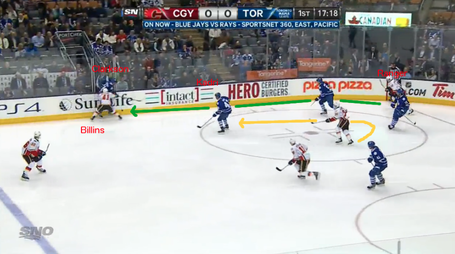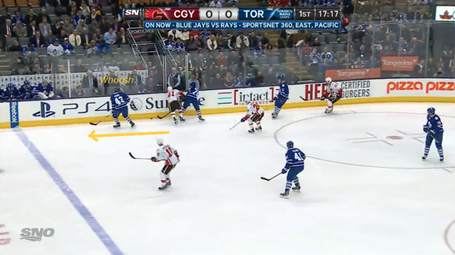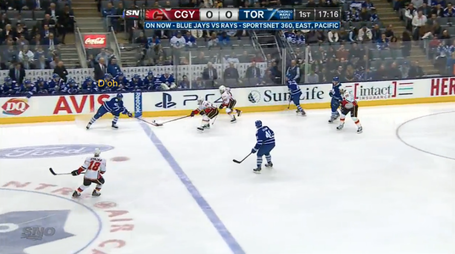Originally published in 2014, this article was republished in 2020 as part of Retro May.
As much as a fan might hate to admit it, the Leafs have a few forwards who might, at least in some sense, be described as "soft". The main problem with this descriptor is that it's become over-used, and most of the time, not in an appropriate context. Moreover, on-air "analysts" use it as a catch-all to explain things to which it isn't related like scoring slumps which is patently ridiculous.
Let's look at a clear example from a game back on April 1st of this past season. Below, we can see a puck that has been rung around the boards by Paul Ranger, but David Clarkson, who is playing right wing here, has already been engaged along the boards by number 41 for Calgary, Chad Billins. Clarkson is unable to control the puck as it dribbles to him.
Nazem Kadri has, to this point, done his job well. He saw the puck go deep in his own end below the icing line, and swooped low to provide support and an outlet to Ranger if needed. Seeing the puck going up the wall towards his blue line, he heads over to support Clarkson to get the puck out and hopefully start a rush.
Unfortunately, Kadri does the kind of thing that I'm sure makes Randy Carlyle lose sleep, and just breezes right by the puck battle, hoping he could pluck it away while in flight and catch Calgary's D off-guard. Yes, that's right, I actually believe that Carlyle would chew Kadri out for this kind of thing. I've watched Kadri play ever since he was a London Knight and this is a Kadri move, not a Randy move. Anyway.
In the next frame, we see Kadri go "whoops" and remember that his coach will murder him if he totally skates by this puck, but his poke-check effort is way short of what should have happened. Coaches always say "move your feet, not your stick" and consider this kind of thing really lazy. Kadri should have gone to the puck, stopped on the puck, and made sure it got out. This would have been a lower-reward play to be sure (because there is no chance of catching Calgary's D flat-footed) but it would have been the defensively responsible thing to do. As an FYI, in this case, the puck did eventually trickle out, but the Leafs were unable to mount any real rush off the play, and Calgary counter-attacked quickly.
This is probably the point at which a colour commentary guy would say that 'a goal often starts with a defensive play at the other end' and that players who play more complete defensive games wind up producing more. The logic seems to hinge on maintaining possession of the puck (which is ironic, given how many analysts despise possession stats) but it's true that making the safe play is better for your team than it is for your own personal stat line.
If a player is slumping or the team is behind, he can probably cherry pick a little (which Kadri is very nearly doing, here) and probably pop a goal or two, but the problem is that those high-reward plays are also high-risk. Simply put, players don't go on scoring slumps because they're "soft". In fact, being soft probably helps more than a few players' stat lines around the league. Sure hurts the team, though.
I chose Nazem Kadri for this mini-breakdown because he is, if we can be honest for a few minutes, one of the most common perpetrators of this defensive crime on the Leafs. To be fair to him though, Joffrey Lupul is at least as bad for this and Phil Kessel does it more than either of them. The other important thing to note is that players can be defensively responsible in more than one way; being occasionally "soft on the puck" may be overshadowed by other things a player does that are good. So in Kessel's case, although he sails by the puck every now and then, he does things that you might also call "responsible" like making good passes from his own end. Overall, the team is less likely to be scored on while Kessel is on the ice than Lupul, because "being soft" is only one aspect of the defensive side of the game.
One final but important note to consider with regards to the "soft" label is that it can be difficult to say if a player is actually deserving of it. There are two reasons for this. First, "softness" is certainly more obvious with some players than with others, and generally, the difference between the players is going to be so difficult to quantify that it's always problematic to use when assessing a player's worth for a contract or trade. So while it's difficult to ascertain the value (or lost value) of a "soft" play, a coach has to recognize it when he sees it, and correct it when possible, because it's a critical part of the game.
This leads to the second reason the "soft" label is problematic: coaches do sometimes tell players not to engage along the boards and it is sometimes difficult to separate a passive system that a coach has implemented with a passive (read: "soft") playing style of a player. We've seen each of Kadri, Lupul, and Kessel's defensive shortcomings under (at least) two coaches now, so Carlyle is certainly not all to blame.
Wait, did I just defend Randy Carlyle?







Comment Markdown
Inline Styles
Bold: **Text**
Italics: *Text*
Both: ***Text***
Strikethrough: ~~Text~~
Code: `Text` used as sarcasm font at PPP
Spoiler: !!Text!!